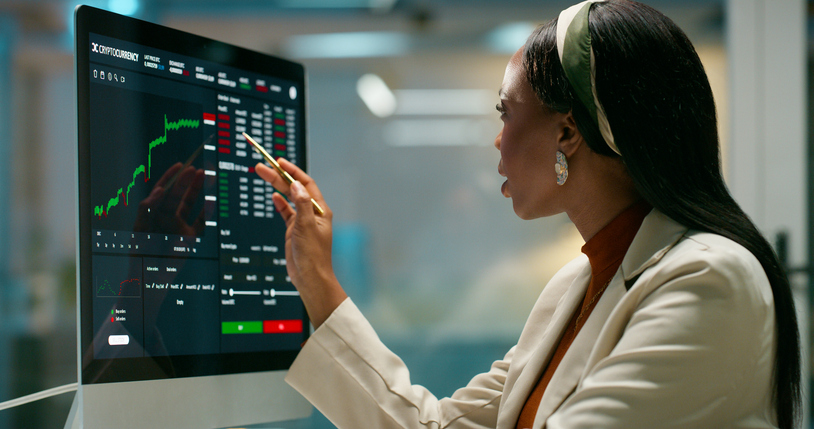Should You Buy Bonds Now? What To Consider
The fixed-income market has been turned on its head in recent years, but there are still opportunities for those looking to buy bonds again.


Profit and prosper with the best of Kiplinger's advice on investing, taxes, retirement, personal finance and much more. Delivered daily. Enter your email in the box and click Sign Me Up.
You are now subscribed
Your newsletter sign-up was successful
Want to add more newsletters?

Delivered daily
Kiplinger Today
Profit and prosper with the best of Kiplinger's advice on investing, taxes, retirement, personal finance and much more delivered daily. Smart money moves start here.

Sent five days a week
Kiplinger A Step Ahead
Get practical help to make better financial decisions in your everyday life, from spending to savings on top deals.

Delivered daily
Kiplinger Closing Bell
Get today's biggest financial and investing headlines delivered to your inbox every day the U.S. stock market is open.

Sent twice a week
Kiplinger Adviser Intel
Financial pros across the country share best practices and fresh tactics to preserve and grow your wealth.

Delivered weekly
Kiplinger Tax Tips
Trim your federal and state tax bills with practical tax-planning and tax-cutting strategies.

Sent twice a week
Kiplinger Retirement Tips
Your twice-a-week guide to planning and enjoying a financially secure and richly rewarding retirement

Sent bimonthly.
Kiplinger Adviser Angle
Insights for advisers, wealth managers and other financial professionals.

Sent twice a week
Kiplinger Investing Weekly
Your twice-a-week roundup of promising stocks, funds, companies and industries you should consider, ones you should avoid, and why.

Sent weekly for six weeks
Kiplinger Invest for Retirement
Your step-by-step six-part series on how to invest for retirement, from devising a successful strategy to exactly which investments to choose.
The interest rate environment changed dramatically – and quickly. So is now the time to add bonds to your portfolio? It's not an easy call.
First, a little history. For a decade or so, owning bonds with maturities of five, 10 or 20 years made little sense. For the 10 years ending in June 2022, the yield on a 10-year Treasury was nearly always less than 3% – well below that of the stocks of the Dow Jones Industrial Average. Even investment-grade corporate bonds were paying paltry interest.
In March 2020, as COVID-19 swept the world, economies slowed drastically, and investors stampeded for safety. The 10-year Treasury briefly touched an all-time low yield of 0.32%. Since then, businesses and individuals started to borrow again, government deficits soared, and inflation reared its ugly head.
From just $107.88 $24.99 for Kiplinger Personal Finance
Become a smarter, better informed investor. Subscribe from just $107.88 $24.99, plus get up to 4 Special Issues

Sign up for Kiplinger’s Free Newsletters
Profit and prosper with the best of expert advice on investing, taxes, retirement, personal finance and more - straight to your e-mail.
Profit and prosper with the best of expert advice - straight to your e-mail.
To dampen price increases, the Federal Reserve raised short-term interest rates 11 times between March 2022 and July 2023, from 0.25% to 5.5%. Longer-term rates also rose, but more slowly. By the end of September, the 10-year Treasury was yielding 4.59% and the 20-year, 4.9%. In other words, you earned less interest from a long-term bond than one that matured in just six months or a year.
Such a phenomenon is called an inverted yield curve, and it's the market's way of saying that higher rates in the near term are going to slow the economy and pare inflation later on. That's a good bet, but it causes a dilemma for investors.
A recurring challenge for bond investors
A bond, certificate of deposit or investment in a money market fund is a loan. You cast your bread upon the waters of the debt market, and in return receive interest from the borrower (government, corporation, bank) and, in nearly all cases, get your original money back.
Usually if the payback time (or maturity) is short, you are paid less in interest because your risk is lower. Today, however, you get more interest. The problem is that after the bond or CD matures in a year or two or five, you will probably want to roll it over or invest your principal again in another bond. And that bond may be yielding less – perhaps far less. What about the long end of the yield curve? If you like the rate on a 20-year bond, should you take the plunge now, or should you wait, betting that yields will rise even more?
Because no one – and I mean no one – knows where interest rates are going, it's a good idea to modulate your bets. One way to do that is to buy intermediate-term debt. Consider a five-year CD from a bank, for example. Barclays is offering FDIC-insured certificates paying 4.5%.
A Treasury note maturing in 2030 yielded 4.61% at the end of September. You can buy Treasuries on the market through a broker or straight from the Treasury during its frequent auctions at TreasuryDirect.gov. A medium-term bond fund linked to an index recently yielded about 5%.
As you mull your options, here are warnings to make your life easier and safer. First, stay away from owning individual corporate, municipal or international bonds unless you know a trusted broker who specializes in debt. The terms tend to be complex and vary widely.
I would also avoid high-yield bonds, the debt of less creditworthy companies, even in the form of mutual funds and exchange-traded funds. The spread, or difference, between such bonds and those of Treasuries with similar maturities is dangerously low – in fact, below historical averages. The market is saying, Don't worry. There's no recession ahead, and even shaky businesses will be able to pay their debts. But I'm not so sure.
A portfolio of IOUs
Bond funds are portfolios of debt assets. These assets can be bought or sold by managers. Even in the case of index funds, bonds (unlike stocks) mature and need to be replaced. Funds own a mix of maturities and types of bonds, so check the composition of the portfolio by consulting a data provider, such as Morningstar, or the issuing company.
Also, beware of high expense ratios. With a stock fund, sending 1% to the manager may reduce your annual return by one-tenth, but with a bond fund, 1% in expenses currently cuts your yearly gross profits by one-fourth or one-fifth.
An excellent choice is the Vanguard Intermediate-Term Bond (BIV), an ETF with an expense ratio of just 0.04%. The fund has a yield of 5.1% and a portfolio split between Treasuries and corporates. All the bonds are investment grade – that is, rated BBB or higher. Roughly three-fifths of the portfolio is rated AAA, the highest category for two of the principal bond ratings agencies, Standard & Poor's and Fitch.
The average maturity of the fund's bond holdings is 7.2 years, and the average duration is 6.3 years. Duration is a term that indicates how much the price of a bond moves when interest rates change. In this case, if rates were to rise by one percentage point, the value of the fund's portfolio would fall by 6.3%.
It may be counterintuitive, but the price of a bond falls as interest rates rise. Say you buy a 10-year bond carrying a rate of 4% when it's issued. In a few years, rates for newly issued bonds that are similar rise. If you try to sell yours, you will take a loss. That's because investors won't want to own a 4% bond when they can buy one paying, say, 5%. In order to sell your bond, you'll have to lower the price, and the longer the maturity, the bigger the loss. Of course, if rates on new bonds fall, then your higher-yielding bond is worth more.
Another attractive choice is the SPDR Portfolio Aggregate Bond (SPAB), an ETF with an expense ratio of 0.03% and a yield of 4.75%. The portfolio is similar to that of the Vanguard fund – a mix of Treasuries and investment-grade corporates, all with a slightly longer average maturity of 8.71 years.
My final recommendation is a managed mutual fund, the Fidelity Intermediate Bond (FTHRX). The expense ratio is much higher, at 0.45%, but the management team has proved its mettle over many years. The fund's yield is 4.96%, with a low-risk portfolio. The fund has returned 2.12% over the past 12 months as rates have shot up – an impressive performance that puts it in the top 5% of Morningstar's Intermediate Core Bond category.
Perhaps you're wondering if you should own bonds at all. My emphatic answer is yes. Own them not because you think you'll make a killing in capital gains if rates fall. Own them because 5% is a juicy return. It could go higher. Or lower. But a steady 5% adds needed ballast to any portfolio, especially at a time when the S&P 500 can return 29% one year (as in 2021) and lose 18% the next.
James K. Glassman chairs Glassman Advisory, a public-affairs consulting firm. He does not write about his clients. He owns none of the securities mentioned here. You can contact him at JKGlassman@gmail.com.
Note: This item first appeared in Kiplinger's Personal Finance Magazine, a monthly, trustworthy source of advice and guidance. Subscribe to help you make more money and keep more of the money you make here.
Related content
Profit and prosper with the best of Kiplinger's advice on investing, taxes, retirement, personal finance and much more. Delivered daily. Enter your email in the box and click Sign Me Up.

-
 Nasdaq Leads a Rocky Risk-On Rally: Stock Market Today
Nasdaq Leads a Rocky Risk-On Rally: Stock Market TodayAnother worrying bout of late-session weakness couldn't take down the main equity indexes on Wednesday.
-
 Quiz: Do You Know How to Avoid the "Medigap Trap?"
Quiz: Do You Know How to Avoid the "Medigap Trap?"Quiz Test your basic knowledge of the "Medigap Trap" in our quick quiz.
-
 5 Top Tax-Efficient Mutual Funds for Smarter Investing
5 Top Tax-Efficient Mutual Funds for Smarter InvestingMutual funds are many things, but "tax-friendly" usually isn't one of them. These are the exceptions.
-
 Big Change Coming to the Federal Reserve
Big Change Coming to the Federal ReserveThe Lette A new chairman of the Federal Reserve has been named. What will this mean for the economy?
-
 Why the Next Fed Chair Decision May Be the Most Consequential in Decades
Why the Next Fed Chair Decision May Be the Most Consequential in DecadesKevin Warsh, Trump's Federal Reserve chair nominee, faces a delicate balancing act, both political and economic.
-
 Yes, Artificial Intelligence Stocks Are Booming
Yes, Artificial Intelligence Stocks Are BoomingIt's fair to ask about the latest tech boom, "Is it really different this time?"
-
 A Value Focus Clips Returns for This Mairs & Power Growth Fund
A Value Focus Clips Returns for This Mairs & Power Growth FundRough years for UnitedHealth and Fiserv have weighed on returns for one of our favorite mutual funds.
-
 Small-Cap Stocks Gain Momentum. That's Good News for This iShares ETF
Small-Cap Stocks Gain Momentum. That's Good News for This iShares ETFThe clouds appear to be parting for small-cap stocks, which bodes well for one of our favorite exchange-traded funds.
-
 11 Stock Picks Beyond the Magnificent 7
11 Stock Picks Beyond the Magnificent 7With my Mag-7-Plus strategy, you can own the mega caps individually or in ETFs and add in some smaller tech stocks to benefit from AI and other innovations.
-
 Should You Be Investing in Emerging Markets?
Should You Be Investing in Emerging Markets?Economic growth, earnings acceleration and bargain prices favor emerging markets stocks right now.
-
 7 Hybrid Adviser Services, Reviewed
7 Hybrid Adviser Services, ReviewedThese hybrid adviser services aim for a sweet spot that combines digital investing with a human touch.